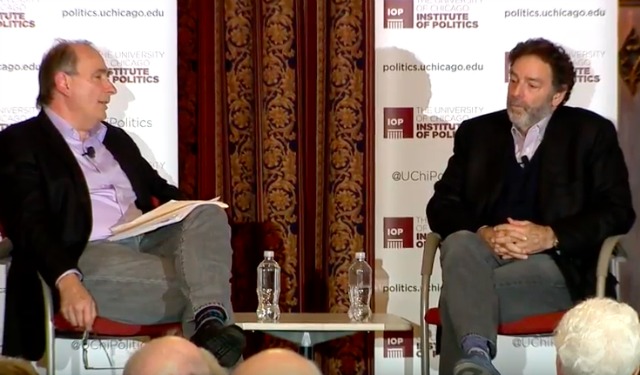Top Clinton Campaign Strategist & David Axelrod Talk What Went Wrong In 2016 Election
By Rachel Cromidas in News on Nov 29, 2016 2:57PM
If election post-mortems have been leaving you with more questions than answers this month, then David Axelrod's Monday night conversation with the Clinton campaign's Senior Strategist Joel Benenson will probably be no exception. But hearing the two longtime political powerhouses deconstruct the shocking and maddening results of the 2016 presidential election, and the narratives surrounding Hillary Clinton that propelled her defeat, gave us some small comfort—we're confused, but at least we're not alone.
Benenson subscribes to one theory that we've worried over since Oct. 28: FBI Director James Comey's 11th-hour decision to re-open investigation into Clinton's much belabored emails probably did her campaign in.
"We were winning this campaign. We came out of the third debate with a solid lead," Benenson said. "And we get to eleven days out, and the FBI director takes an unprecedented action that throws a monkey wrench into the campaign that you couldn't have anticipated."
Benenson, who worked on President Barack Obama's 2008 and 2012 campaigns before top Clinton aide Huma Abedin connected him and the candidate in 2014, spoke with Axelrod, director of the University of Chicago Institute of Politics, at the Hyde Park campus. There, he laid out a familiar list of challenges that Clinton faced going into the election to a packed crowd of presumed (at least, judging by the tenor of the audience) liberals.
First, there were the emails. Voters had for the most part made up their minds about Clinton's so-called email scandal long before Comey's announcement, Benenson theorized. But the announcement became a new flashpoint around the long-simmering subject too late in the game.
"It put it back into the discussion," he said. "You're running a campaign where your closing argument is out there, and you now have the FBI to inject something back into the campaign, unprecedented, you have Trump surrogates going out there and using it to gin up their base."
Then, there were the internal campaign emails, released by Wikileaks throughout the year, that further fueled voter mistrust.
"I've always said that no campaign could have endured the impact in that way," Axelrod said.
Benenson said the campaign didn't verify the emails because they were subject to manipulation by the hackers—for example, an email exchange released by Wikileaks in which Benenson asked campaign aides whether they had a sense of Clinton's core message. Benenson said it was taken out of context.
"Voters were just conflating all the email stuff," he said. "It was an annoyance, because think about how much attention those emails got, because it was so titillating to the press."

David Axelrod (left) and Joel Benenson.
Benenson was light on critique over how Clinton's campaign was run, but he listed several other challenges that played a role in Donald Trump's surprise election day upset: the difficulty, historically, of coming from the same party as a sitting, two-term president; the strength of this election cycle's third party candidates; bad polls; voter suppression; and of course, the double standard between Clinton, who faced accusations of untrustworthiness from the outset, and Trump, who constantly lies with impunity.
"He just keeps saying stuff that isn't true, and I don't think for a minute he believes they're true," Benenson said. "The thing that you can’t control about him was how he was able to dominate news and manipulate the media. And I’m not using the word manipulate in an insidious way. If you don’t care whether anything you say is true or not, and you’re not being judged harshly for it, then you can keep saying stuff that’s not true."
Benenson also analyzed one frequent and oft-parodied criticism of Clinton: that she comes across to the public as guarded and inauthentic.
"As I said to her at the outset, you are the most famous and least-known person there is," he said. "She is a fairly private person, I think she always has been."
"Has she endured unusually harsh scrutiny?" Axelrod asked.
"Oh, for 30 years," Benenson replied. "Absolutely."